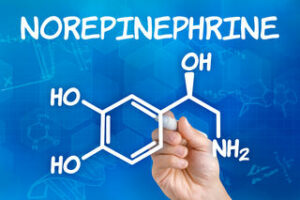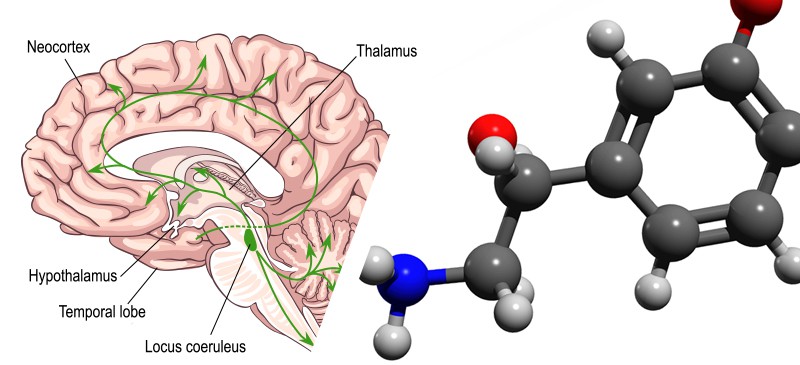If you are one of the millions of people who suffer from ADHD, then you know that finding a treatment that works can be a challenge. One of the possible treatments for ADHD is medication, and one of the most common medications used is stimulants. Stimulants work by increasing levels of norepinephrine in the brain. But what is norepinephrine, and why is it important for ADHD? In this blog post, we will discuss the role of norepinephrine in ADHD and how it can help to improve symptoms.
Contents
Understanding Norepinephrine And ADHD
 Norepinephrine is a neurotransmitter that helps to regulate alertness and focus. ADHD is characterized by problems with inattention, impulsivity, and/or hyperactivity. Low levels of norepinephrine are thought to be one cause of ADHD. It is produced by the adrenal glands and is released into the bloodstream in response to stress. It is also involved in the fight-or-flight response, which is the body’s natural reaction to danger. Norepinephrine acts as a stimulant and can increase heart rate, blood pressure, and respiration. It also increases blood sugar levels and can affect mood and behavior.
Norepinephrine is a neurotransmitter that helps to regulate alertness and focus. ADHD is characterized by problems with inattention, impulsivity, and/or hyperactivity. Low levels of norepinephrine are thought to be one cause of ADHD. It is produced by the adrenal glands and is released into the bloodstream in response to stress. It is also involved in the fight-or-flight response, which is the body’s natural reaction to danger. Norepinephrine acts as a stimulant and can increase heart rate, blood pressure, and respiration. It also increases blood sugar levels and can affect mood and behavior.
Norepinephrine is made in the brain from dopamine. Dopamine is a neurotransmitter that helps control the pleasure and reward centers of the brain. Dopamine also plays a role in the movement, motivation, and attention.
People with ADHD have trouble regulating their levels of norepinephrine. They may have low levels of norepinephrine, or they may not be able to release it properly. This can lead to problems with focus, impulsivity, and hyperactivity.
Does ADHD Increase Norepinephrine?
There is no simple answer to this question. Researchers are still trying to understand all of the complex factors that contribute to ADHD. However, we do know that norepinephrine plays an important role in regulating attention and focus.
Some studies have found that people with ADHD tend to have lower levels of norepinephrine than those without ADHD. This may be one reason why stimulant medications, which increase norepinephrine levels, are so effective in treating ADHD.
Norepinephrine and dopamine, two different neurotransmitters, help people focus throughout the day. Having low levels of these chemicals in the brain may make symptoms of ADHD worse since it is harder to pay attention.
Do People With ADHD Have Less Norepinephrine?
 One way to tell if someone has ADHD is by their low levels of dopamine and norepinephrine. Dopamine is a neurotransmitter chemical that’s sent from nerve cells into the brain, and its lack in people with ADHD “wire” them chemically.
One way to tell if someone has ADHD is by their low levels of dopamine and norepinephrine. Dopamine is a neurotransmitter chemical that’s sent from nerve cells into the brain, and its lack in people with ADHD “wire” them chemically.
There is some evidence that people with ADHD may have lower levels of norepinephrine, but the research is far from conclusive. One study found that people with ADHD had lower levels of norepinephrine in their urine, but another study found no difference in the level of norepinephrine in the brain between people with and without ADHD.
So, while lower levels of norepinephrine may be a cause of ADHD, we don’t know for sure. And even if low levels of norepinephrine are a cause of ADHD, it’s not clear how that would work.
What Are The Symptoms Of Low Norepinephrine in ADHD?
Several symptoms are associated with low levels of norepinephrine in ADHD. These include:
- Inattention
- Hyperactivity
- Impulsivity
- Disorganization
- Restlessness
- Fatigue
- Difficulty concentrating
- Memory problems
- Mood swings
- Anxiety
- Depression
If you or someone you know has ADHD and is experiencing any of these symptoms, it is important to talk to a doctor or mental health professional. Low levels of norepinephrine may be the cause of these symptoms and treatment can help.
What Causes Low Norepinephrine in ADHD?
There are several possible causes of low norepinephrine in ADHD. These include:
Genetic factors: Low levels of norepinephrine may be passed down from parents to children. For instance, if a parent has low levels of norepinephrine, their child may also have low levels of this chemical.
Brain injury: A traumatic brain injury (TBI) can cause low levels of norepinephrine. TBI can occur after a car accident, fall, or another type of accident.
Stress: Stress can cause the body to release norepinephrine. When a person is constantly under stress, they may have lower levels of this chemical. It’s not just exposure to toxins that can lead to low levels of norepinephrine. Stress can also be a factor.
Environmental factors: Exposure to certain toxins or stressors in the environment can lead to low levels of norepinephrine. For example, exposure to lead or other heavy metals can cause this chemical imbalance. For example, studies have shown that children who live in poverty are more likely to have ADHD.
Medical conditions: Some medical conditions can also lead to low norepinephrine levels. For instance, Addison’s disease, which is a disorder of the adrenal gland, can cause this chemical imbalance. For instance, people with Addison’s disease may have low levels of norepinephrine.
How Is Low Norepinephrine Diagnosed in ADHD?
If you think you or your child has ADHD, it is important to talk to a doctor. They will ask about your symptoms and medical history. They may also do a physical exam and order tests, such as a blood test. This can help to rule out other conditions that may be causing your symptoms.
If low norepinephrine is suspected, your doctor may order a test called a norepinephrine and dopamine transporter (DAT) scan. This scan uses imaging to look at how well the norepinephrine and dopamine transporters are working in your brain. If they are not working well, it may be a sign of low norepinephrine levels.
Treatment Options
If low norepinephrine is the cause of ADHD symptoms, treatment can help. There are several ways to treat low norepinephrine in ADHD. It includes:
Medication
Stimulant medications are often prescribed to increase norepinephrine levels in people with ADHD. The most common treatment is medication. Most common medications include:
- Stimulant medication: Stimulant medication can help to increase norepinephrine levels. Examples of stimulant medications include methylphenidate (Ritalin) and amphetamines (Adderall).
- Non-stimulant medication: Non-stimulant medications can also be used to treat ADHD. These medications work by increasing norepinephrine levels. Examples of non-stimulant medications include atomoxetine (Strattera) and guanfacine (Intuniv).
Therapy
Therapies are considered the first-line effective treatment for ADHD, some common therapy types are:
Behavioral therapy: Behavioral therapy can help to improve symptoms of ADHD. This type of therapy can teach children and adults with ADHD how to manage their symptoms. For example, behavioral therapy can help people with ADHD learn how to plan astay organized, and control impulsive behavior.
Cognitive Behavioral Therapy (CBT) can help people with ADHD learn how to better control their thoughts and actions. This type of therapy can also help people with ADHD learn how to better manage their time, set goals, and stay organized. CBT may be particularly helpful for people who have difficulty with impulsivity and/or hyperactivity.
Lifestyle changes
Many lifestyle changes can alleviate symptoms of ADHD. Some common ones are:
- Diet: Eating a healthy diet can help to improve symptoms of ADHD. Foods that are high in protein and omega-three fatty acids are beneficial for people with ADHD.
- Exercise: Exercise can also help to improve symptoms of ADHD. Exercise can help to increase norepinephrine levels and improve focus and concentration.
- Relaxation techniques: Relaxation techniques such as yoga and meditation can help to calm the mind and body.
- Organization: Organizing your home and work environment can help to reduce distractions and improve focus.
- Time management: Time management skills can help you to better utilize your time and get tasks done more efficiently.
Support Group
Norepinephrine is a neurotransmitter that helps to regulate mood, focus, and energy levels. It’s thought that people with ADHD may have lower levels of norepinephrine than those without the condition. The support groups can provide valuable information and social support for those dealing with ADHD.
There are many online and in-person groups available to offer guidance and understanding. Support groups for ADHD can provide advice, emotional support, and coping strategies from other people who are suffering from ADHD.
While there is no cure for ADHD, these options can help to improve symptoms and make everyday life more manageable. If you or someone you know has ADHD, it is important to seek treatment. Low norepinephrine levels can cause serious symptoms, but treatment can help. Talk to your doctor about the best treatment options for you or your child.
Conclusion
It may be concluded that norepinephrine ADHD is a very important neurotransmitter for people suffering from ADHD. It is also important to note that this neurotransmitter plays a role in many other disorders and diseases. Therefore, it is important to understand the functions of norepinephrine and how it can be beneficial or detrimental to our health.
For further information and suggestions, please contact Therapy Mantra. We have a team of expert therapists and psychiatrists that can help you overcome this problem. Get in touch with us right away to learn more about our services. You may also make an online therapy session or download our free Android or iOS app.


